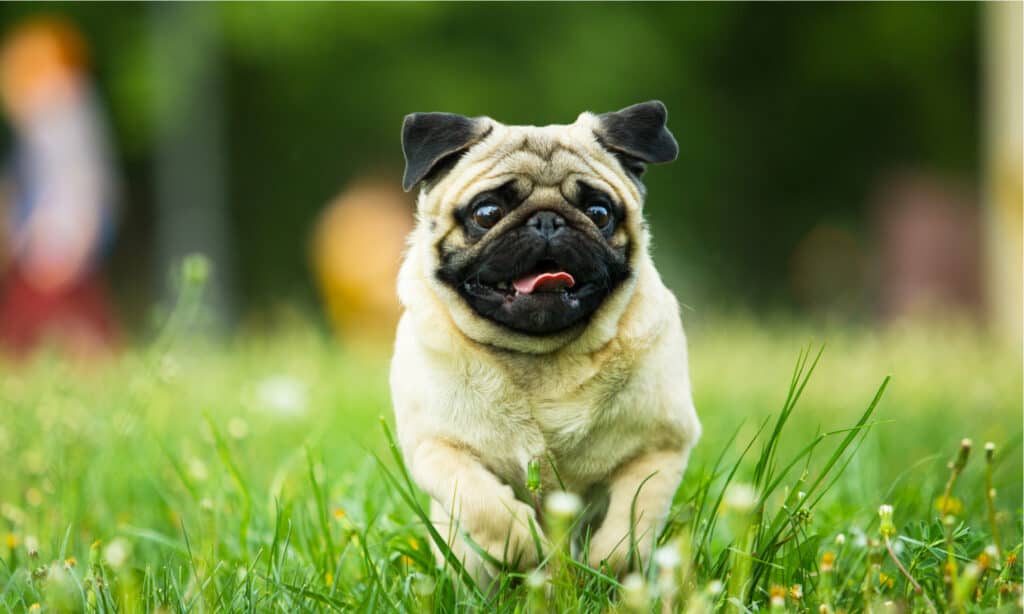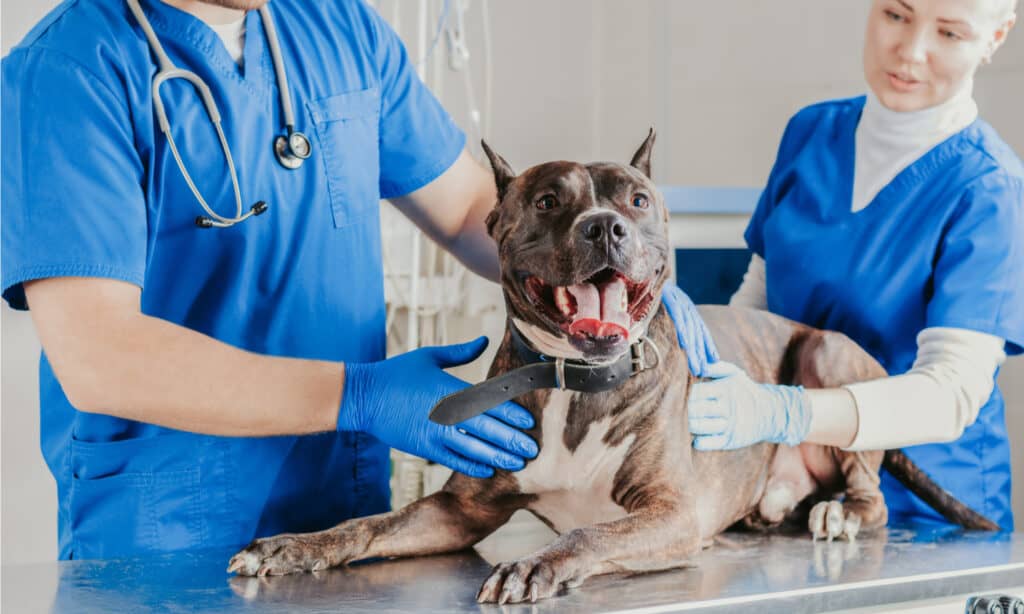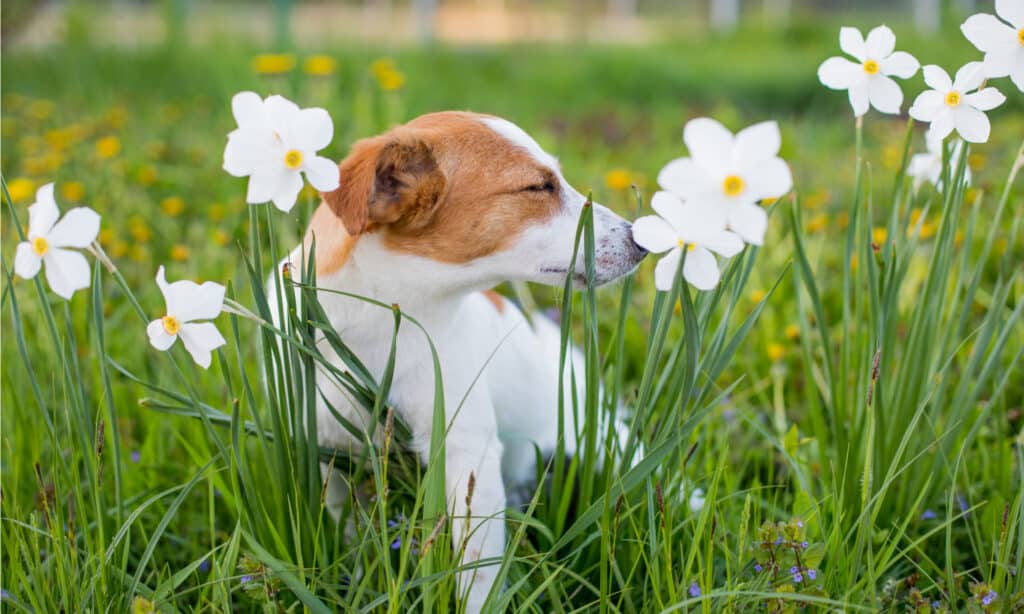Why do dogs sneeze? Dogs sneezing can be the cutest sound but there is more to it than you think. There are so many reasons that could be behind it including communication, excitement, infections, and allergies. Most of the time it is perfectly harmless, but it could also be an indicator of something more serious.
So, if you need to know more about dog sneezing, read on because we’ve got all the facts lined up. Here are the top causes of dog sneezing.
#1 They Have an Excellent Sense of Smell
A dog’s sense of smell plays a huge role in how they explore the world around them. Whilst we humans rely heavily on our sight, our dogs are collecting loads of information on what things smell like. We have around 6 million olfactory sensors in our noses but dogs have around 300 million!
The part of the brain that analyzes new smells is 40 times larger in dogs than in humans. So, dogs are attracted to new odors and spend a lot of time sniffing. Inevitably, this is going to lead to small specks from the environment entering their nose and making them sneeze!
#2 The Shape of Their Muzzle
The brachycephalic dog breeds, such as the Pugs and Bulldogs, have a normal-sized lower jaw but a short upper jaw. They have an elongated soft palate that irritates the throat. At the same time, their nasal passages are compressed and they have narrow nostrils so sneezing is more common.
Also, these breeds often make a snorting or snuffling sound as they breathe and this is normal for them. It should not be confused with a sneeze. However, if your dog starts to struggle to breathe you should always consult a vet.
These breeds are also more likely to have a ‘reverse sneeze’ which is something that we examine in more detail below.

©Poltavets Anastasiia/Shutterstock.com
#3 Exposure To Environmental Irritants
Dogs do a lot of sniffing, especially breeds with a high prey drive like the Cocker Spaniel. If you are going to stick your nose in piles of dust and dirt, you will inevitably inhale an irritant that will make you sneeze!
This is simply the body’s way of expelling a foreign object from the nose and is nothing to worry about. Loads of things can irritate a dog’s nose including fragrance sprays that you apply to their coat, household cleaners, dust, and dry soil. Perhaps you could try to distract your dog from sniffing with a ball game?
#4 Something Stuck in Their Nose
Dogs sneeze because something may have gotten wedged in their nostrils. This cause of sneezing is quite easy to spot though because it will be accompanied by other behavior. As well as excessive sneezing, your dog will probably paw at its nose and try to aggressively rub its nose on the ground. All sorts of things can get stuck up a dog’s nose, but the most common culprits are crumbs of food, small hairs, and blades of grass. Many dog owners find that the cause is a foxtail bur. These are small seeds with sharp barbs on them that can also get stuck in the eyes, mouth, and even the genitals. The problem is that they do not stay where they are – they move around the body and this can lead to serious health problems and even death.
If your dog is acting as if they have something stuck up their nose (there may also be blood coming from their nostrils when they sneeze) get them to a vet right away to be checked out before the foxtail bur can embed itself too deeply.

©Andy Gin/Shutterstock.com
#5 A Method of Communication
The world of dog communication is fascinating. Despite the fact that humans have shared their lives with dogs for thousands of years, we are still learning about how dogs communicate with each other. Some research from 2007, indicates that the sneeze may be part of canine communication.
The study was reported in The Proceedings of the Royal Society of Biological Sciences. It found that African Wild Dogs living in a pack used it as a way of voting for a decision proposed by the pack leaders. It worked like this: the pack leaders initiate moving the pack from one location to another by rising from a resting position and adopting a certain posture. If only a few dogs ‘ sneezes’ their approval, the whole pack stays where they are. However, if a lot of the pack sneeze at this moment, they all get up and move on!
It is also thought that dogs use sneezing as a way of saying that they feel uncomfortable and need some ‘time out’. It can be interpreted as a calming signal.
#6 A Part of Playing
Have you noticed your dog sneezing during a fun game? This phenomenon is called a ‘play sneeze’ and is quite common, especially in smaller breeds. It usually happens when they are very excited. Some experts think that it is a way of telling their playmates that this is just a game and that they do not mean them any harm – even if the game is getting quite boisterous.
You may be able to learn to spot when a play sneeze is coming. Your dog will curl their lips and wrinkle its nose just before its whole body shakes with the sneeze. A play sneeze is shorter than a regular sneeze and seems to come from the nose and not the lungs.
#7 A Way of Getting Attention
What do you do when your dog has the cutest sneeze ever? You go rushing over and give them loads of attention, right? Dogs are highly skilled at getting what they want out of humans. They have been doing it for thousands of years!
So, once your pooch learns that a sneeze gets you to pay them attention, they will have no hesitation to use this to their advantage.
This ‘fake sneeze’ is a ploy to let you know that they want some food, to play a game, or to go out for a walk. Clever dog owners notice that these ‘sneezes’ happen around regular feeding times and walk times.
How can you tell it’s a fake sneeze? It sounds slightly different from a regular sneeze and your dog will look right at you while they are doing it to assess if it has had the desired effect! If you keep staring at the TV, they may do it again!
#8 Allergies
Human sneezing is often associated with allergies and the same is true for our four-legged friends. They can also be allergic to the same things such as different types of pollen, foods, and dust. Because dogs sniff a lot, they are more likely to inhaul the allergen. If the allergy is seasonal (i.e. it gets worse at particular times of the year) it is more likely to be a pollen allergy.
Allergy sneezing is often accompanied by itching, coughing and wheezing and a runny discharge from the nose and eyes. This is definitely something that you need to talk to your vet about. They can prescribe highly effective anti-allergy medication if that is found to be the cause. There are also excellent dog foods available for dogs that have allergies.
#9 Health Problems
Some causes of sneezing in dogs should not be ignored. Sneezing can be the result of a nasal infection or infestation. This can be caused by inhaling a fungus that lives on hay and dry grass. As well as sneezing, your dog will paw at their nose, have bleeding or discharge from the nose, and swelling. They need to see a vet right away.
Rarely, sneezing is caused by nasal mites. These tiny creatures live in dirt and enter your dog’s nose when they have a good sniff around your yard. It will be obvious that your dog has irritation in their nose as well as sneezing. They may also have nosebleeds and a lot of discharge. This is another cause of sneezing that needs to be checked out by your vet.
Your dog could have an infected tooth. In particular, the roots of the third upper premolar teeth are very close to the nasal passages. It is worth checking for dental problems if the sneezing seems excessive.
Finally, a tumor in the nasal passage can be a cause of sneezing. Dogs can get cancer from passive smoking their owner’s cigarette smoke. Breeds with longer noses are especially susceptible. Your vet will be able to investigate this for you.

©Elena Sherengovskaya/Shutterstock.com
Why Do Dogs Sneeze When They Play?
This is a ‘play sneeze’ and is part of the communication between two dogs during play. It can also happen when a human is playing with a dog. It is a way of diffusing a situation and saying “It’s okay, this is only a game.”
However, it can also be used to indicate that a dog needs some time away from the game and is feeling a bit overwhelmed so watch all the other body language closely. If the game is no longer fun, bring it to a close by distracting with a toy or a treat.
Why Do Dogs Sneeze at You?
This is an attention sneeze. Many dog owners report that their dog moves close to them and sneezes whilst looking straight at them. Some dogs even sneeze in your face! It means “Look at me right now, I want something from you”.
As methods of communication go, it is not the most pleasant for the dog owner. From a dog’s point of view, it is usually highly effective!
Why Do Dogs Sneeze When They Wake Up?
This is most likely to be an allergic sneeze. Many dogs sleep on the floor where there is more dust and allergens such as house dust mites and pollen can accumulate. Also, pollen counts are higher in the morning so this is when your pooch is most likely to react to this allergen. You may find that a raised dog bed helps with this.
Dog Reverse Sneezes
Dogs can sneeze backward! The medical name for this is paroxysmal respiration. It is a rapid inhalation as opposed to the rapid exhalation that characterizes a regular sneeze. It can sound as if your dog is laughing and is most common in the brachycephalic breeds. Also, your dog braces itself before it happens – standing with its head forwards and its elbows apart.
So, what does a reverse sneeze mean? Usually, it means no more than a normal sneeze. It is simply a reaction to an irritant and the nose or throat has gone into a temporary spasm. It may help if you massage your dog’s throat gently or blow in their face. This will make them swallow and it will ease the spasm. However, if it happens a lot, speak to your vet about it.
When To Be Concerned About a Dog Sneezing
Most dog sneezing is nothing to worry about so just enjoy it for the cute behavior that it is. However, if it is excessive and/or accompanied by other symptoms such as pawing at the nose, bleeding, discharge or swelling, it must be investigated by a vet.
Some sounds that your dog makes may sound a bit like a sneeze but are actually something very different. A true sneeze is a sharp and clear sound. If it doesn’t sound like this, it is not a sneeze!
Of particular concern is a honking type of sound. This can indicate a tracheal collapse and this is more common in smaller breeds. You will also notice that your dog seems to be struggling to breathe and they may have a blue tinge on their gums. They will need to see a vet right away.
The photo featured at the top of this post is © olgagorovenko/Shutterstock.com
Ready to discover the top 10 cutest dog breeds in the entire world?
How about the fastest dogs, the largest dogs and those that are -- quite frankly -- just the kindest dogs on the planet? Each day, AZ Animals sends out lists just like this to our thousands of email subscribers. And the best part? It's FREE. Join today by entering your email below.
Thank you for reading! Have some feedback for us? Contact the AZ Animals editorial team.







